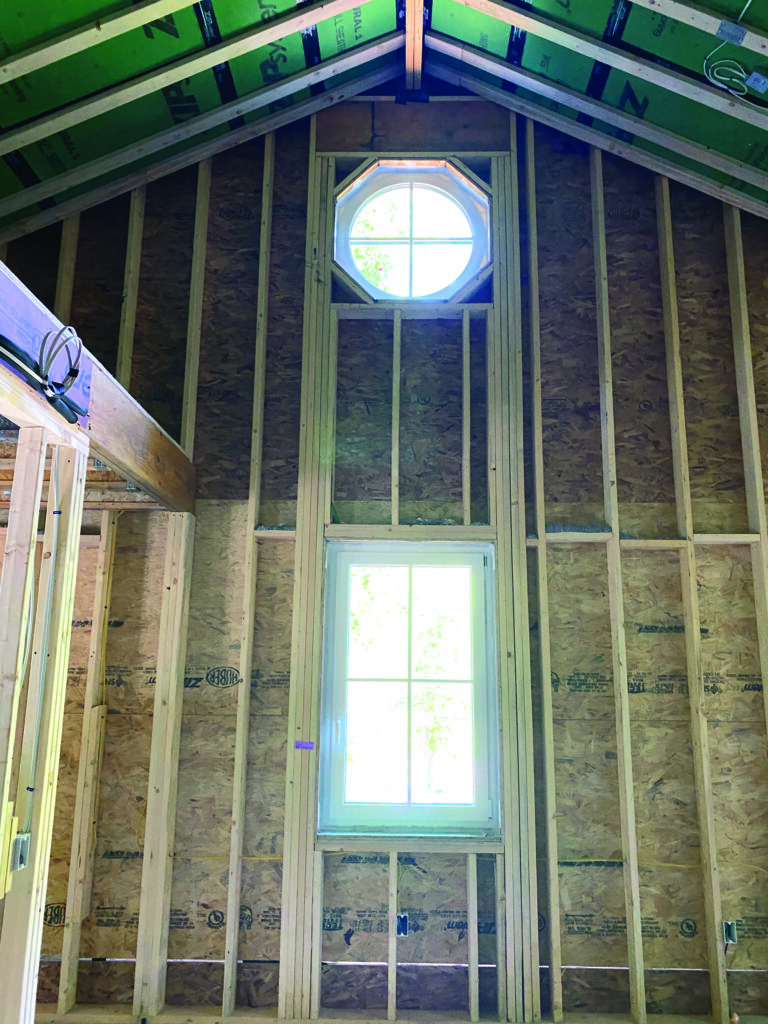Certified ‘passive house’ project in Cooperstown nears completion
Chestnut Crossing reaches energy efficiency goals

Josh Edmonds stood outside Chestnut Crossing – the 13-unit apartment building nearing completion at 10 Chestnut Street in Cooperstown – and described the construction process that will render the building a Certified Passive House, a concept manifesting renewable energy and environmentally-friendly designs that set standards for ‘green’ buildings everywhere. Mr. Edmonds’s company, Simple Integrity, is building the project.
“I don’t know why every new construction isn’t done this way,” he said. “For now, it has to be a lack of education for contractors and home-buyers.”
“When buyers sit down with a contractor, they’re thinking more about how they want a free-standing tub or a wood-burning stove more than they’re thinking about the way we’re going to blanket the building in insulation or install heat pumps,” Mr. Edmonds said. “We start our presentations with that design-and-build standard.”
Building to the certified passive house standard, he said, adds an estimated three- to four-percent premium over the cost of a house built to current code. The buyer recoups that initial outlay within the first four years of ownership.
Francesca Zambello is his partner in ZAED Properties, LLC, which owns the Chestnut Crossing project. Both she and Mr. Edmonds say they see the building as a way to educate the community – home owners and contractors alike – on the value of passive house certification and the relative ease with which it can be incorporated into new building design. They had hoped to invite the public to an open house before the walls went up to demonstrate the process by which they’ll achieve energy efficiency goals required for ‘passive’ certification.
“Passive housing a model that everyone should be using,” Ms. Zambello said. “It’s not just a do-good thing, it’s not just a fad. It aligns with our firm dedication to the environment and our recognition of the need for new and affordable housing in and around Cooperstown.
Passive house principles “create safe, resilient, comfortable and – most importantly – energy efficient structures,” says the website of PHIUS, the Passive House Institute of the United States. PHIUS certification doesn’t come easily – Mr. Edmonds said the group works to establish efficiency standards in much the same way that automobile designers work to achieve standards for what is or is not a fuel-efficient vehicle.
“It’s hard to nail down exactly what an ‘energy-efficient’ building is,” he said. “One builder might say ‘you can use a double-pane window here and it’s energy efficient,’ another might say ‘we use a triple-pane window and we’re energy efficient.’ The definition can change from builder to builder. That’s not wrong, it’s just that there aren’t a lot of set standards out there.”
“The passive certification, on the other hand, demands certain and verifiable levels of performance,” Mr. Edmonds said. “It’s a third-party certification that gives the building owner the assurances they need to know they’re at the very top of the efficiency ladder.”
Among the criteria: climate-specific data for the region in which the building is to be erected. Data for Cooperstown, Mr. Edmonds said, will differ significantly from data out of Arizona. Builders in a given region use hyper-local climate numbers to build structures with efficiency standards that best meet local conditions.
The building, outside and in, looks no different from any other at this late stage of construction, but Mr. Edmonds pointed out several of the specifics that improve on its ultimate efficiency. Among them, an exterior insulation that “creates a complete blanket around the building” that he said makes a huge difference in the building’s ability to stay warm in the winter and cool in the summer. Also, an air-tight construction that controls the inflow and outflow of air to keep indoor air quality at its highest.
Mr. Edmonds showed one of four units in the building that feature MERV-13 filters – hospital-grade – that he said are becoming standard for schools and multi-family structures such as Chestnut Crossing.
With the building on target for a Fall 2022 opening, he and Ms. Zambello said Simple Integrity has more projects on the way; the company already consults for other builders looking for energy efficient design techniques and trends.
“Passive housing is an important way to respect the environment and isolate yourself from future changes in the energy market,” Mr. Edmonds said, noting $7.00/gallon heating oil prices. “It’s not that difficult to do and we think it shouldn’t be long before it’s the standard.”

